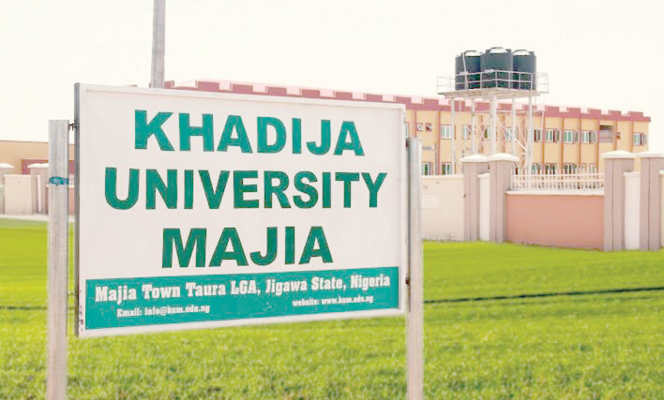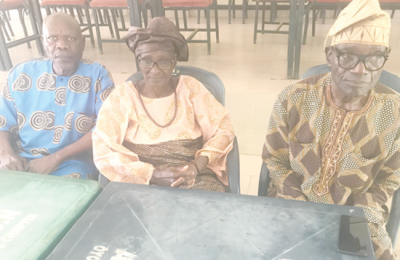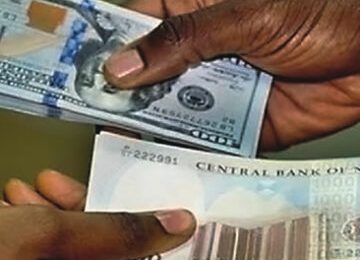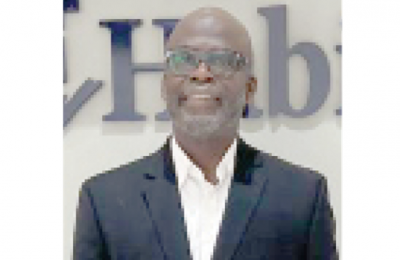ADAMU AMADU reviews the recent move by the Jigawa State to acquire a privately owned university, despite having two federal universities within the state among a number of other tertiary institutions. This is as the state struggles to fill these universities with students from the state who have largely performed poorly in WAEC and NECO examinations.
The Jigawa State government recently purchased Khadija University Majia (KUM), a private university established by a wealthy individual at Majiya village his hometown in Taura Local Government Area of the state, at the sum of N11 billion.
Making the announcement was the Commissioner for Information, Youth, Sports and Culture, Mr Sagir Musa, after a state executive council meeting presided by Governor Malam Umar Namadi. Musa explained that the council approved the sum of N4billion as part payment for the university.

He said the council approved the purchase of the university from its proprietor after a series of negotiations, agreed at the cost of N11 billion on immediate payment of N4 billion while the remaining balance will be paid in instalments.
According to him “that the State Government found it imperative to buy the existing private university in the state and convert it to a state-owned university, to expand access to higher education for the teeming Jigawa youths and to produce the required manpower for sustainable growth and development of the state.
“A committee comprising the State Commissioner for Higher Education and Commissioner for Basic Education was established and saddled with the responsibility of coming up with the process of taking over the newly acquired university and the modalities needed for continued running of it without jeopardising the fate of the admitted students”, Musa stated.
Sealing the deal for the procurement of the university has made the Jigawa state to have two state owned university, that is: the Sule Lamido University (SLU) Kafin Hausa and the Khadija University Majia (KUM). This in addition to the State College of Education, Gumel; Jigawa State Polytechnic, Dutse; College of Agriculture, Hadejia; Colleges of Nursing and Midwifery Birninkudu, Babura and Hadejia.

The state also has two federal universities, that is: Federal University Dutse (FUD) in the state capital and Federal University of Technology (FUT) Babura. These are in addition to Husaini Adamu Federal Polytechnic Kazaure.
There is also the proposed Federal College of Education (Special) sited at Birninkudu Local Government Area and College of Agriculture located at Kirikasamma Local Government Area, which was approved by former President Muhammadu Buhari, but is yet to take off.
Despite these advantages of the state having four functional universities: one each in Jigawa Southeast, Jigawa Central and two in Jigawa Northwest senatorial districts, plus polytechnics and monotechnics spread across the state, the state cannot fill its quota in the tertiary institutions within the state, not to talk of neighboring states within the catchment area, or other institutions across the country.
The failure of indigenous students in the state to gain admission in the tertiary institutions within and outside the state has been attributed to mass failure of the students in the West African Senior School Certification of Education (WASSCE), National Examination Council (NECO) and National Business and Technical Examination Board (NABTEB).
This failure is believed to be as a result of a poor foundation at primary and secondary education levels.
As evidence is the outcome of the 2024 National Examination Council (NECO) result released recently. Whereas states in the Southeast region performed excellently, Jigawa State was mentioned among the worst performing states, according to the registrar of the council in a statement.
According to the report, the state has a low percentage of good results acquired by its candidates. Even at that, the few performing students were students of private and unity secondary schools. Most of those who failed were students from public schools belonging to the state.
The calamitous situation of education in Jigawa State is attributed to lackadaisical attitude of the state government and the 27 local government areas in the state, leading to the lack of qualified teachers, lack of or poor teaching and learning materials, lack of or inadequate supervision of teachers and educational facilities in the public primary, junior and senior secondary schools.
Another factor is massive retirement and death of teachers at both primary and secondary school levels without immediate replacement and recruitment. While there have been a few cases of recruitment of teachers in both primary and secondary schools, politics and favouritism by the politicians and government officials are top issues preventing the employment of deserving and qualified teachers.
When it comes to facilities, there are poor quality infrastructures such as classrooms, staff rooms, hostels and staff quarters. For government boarding schools, there is the need for the renovation of their structures and the provision of adequate seats for teachers and students in the schools.
Looking at all these obstacles in the Jigawa educational sector, many parents and educationists described Governor Malam Umar Namadi’s idea of purchasing another university as misplacement of priorities and an additional burden of cost to the government.
Speaking to Nigerian Tribune, some parents in the state were of the opinion that the state government should focus more on primary and secondary education that will provide all the necessary attention that would give a good foundation for students in the state to pass O Level examinations. This in turn would give them opportunity to secure admission into universities, be it they state-owned, federal or privately-owned.
Malam Mahmud Yusif, a retired civil servant, said: “To me the procurement of Khadija University is beating about the bush. Students can’t pass SSCE and JAMB. Why use such huge amount to buy a university. Who are they sending to study there? Or did he (the governor) buy it for students from outside the state to study?”
A serving teacher in one of the junior secondary schools in Yankwashi Local Government Area, who did not want his name published said, “I’m in the system. I can swear that many of the primary schools and junior secondary schools including the one I’m teaching in don’t have chalk to use and teach pupils and students in the classes. Forget about textbooks and other teaching and instructional materials.”
According to him “there are some primary and secondary schools in this state that have either one or no teacher at all, not because there are no pupils or students. To be frank there are a lots of window dressing in the Jigawa educational policy. They build or renovate schools that are at major roads, but even at that, when you enter into the school you will be disappointed.”
Findings by Nigerian Tribune indicated that 83.2 percent of children within the ages of universal basic education were out of school, roaming about the streets of Jigawa State.
Chief of UNICEF’s Kano Field Office, Mohammed Farah, during a commitment meeting with the Jigawa State House of Assembly in Kaduna State recently said that only 16.8 percent of children in the state were in school.
Mr Farah explained that 44 percent of primary school-age children and 52 percent of secondary school-age children in Jigawa State were not attending school. This creates a significant education gap in the state and deprives them of their right to universal basic education.
Farah further noted that foundational literacy and numeracy rates in Jigawa State were critically low. He therefore called on the House of Assembly to address these education challenges before the next Multiple Indicator Cluster Survey (MICS) in 2026/2027, while advocating a shift in the state’s education landscape.
Read Also: Reparation cannot exonerate UK, others from crimes of slavery — Group
Another report revealed that Jigawa State has the fifth largest number of out-of-school children in Nigeria after Bauchi, Kebbi, Katsina and Kano State. According to the United Nations Educational, Scientific and Cultural Organisation (UNESCO), there are about 784,391 children not in school in the state.
However, in an effort to improve education in the state, Governor Namadi made the sector part of his 12-point agenda with the aim of bringing innovations, policies and programmes to ensure speedy positive changes in the education.
In that regard the state executive council had approved over N740.7 million for the award of contracts for the construction of classrooms, laboratories, toilets, admin blocks, ICT Labs and workshop at some selected schools across the state (GDSTC -Kafin Hausa & Babura, CGSSS- Roni & Jahun, GDSTC – Gumel, Kanya Babba, GDSSS –Ringim, Dutse and Hadejia respectively)
The information commissioner, Mr Sagir Musa, speaking after an executive council meeting, said: “In line with present administration’s effort to improve educational development in the state over N740.7 million contracts have been approved for the construction of classrooms, laboratories, toilets, admin blocks, ICT Labs and workshop at some selected schools across the state.
Sagir added that there would be the payment of bursary allowance to the tune of N624,024,000 in respect of 14,269 newly interviewed and returning students at Sule Lamido University Kafin Hausa, College of Education Gumel, Jigawa State Polytechnic Dutse, Jigawa State Polytechnic Hadejia and College of Education and Legal Studies Ringim for 2023/2024 Academic Session.
Nigerian Tribune further gathered that Governor Namadi has approved the release of over N3.554billion for the State Universal Basic Education Board and Universal Basic Education Commission as counterpart funding.
The governor approved the amount to include the construction of 304 classrooms, renovation of 515 classes and fencing of 27 schools.
Others are the procurement of 29,984 sets of classroom furniture, construction of four blocks of science and computer laboratories and 646 teachers furniture.







